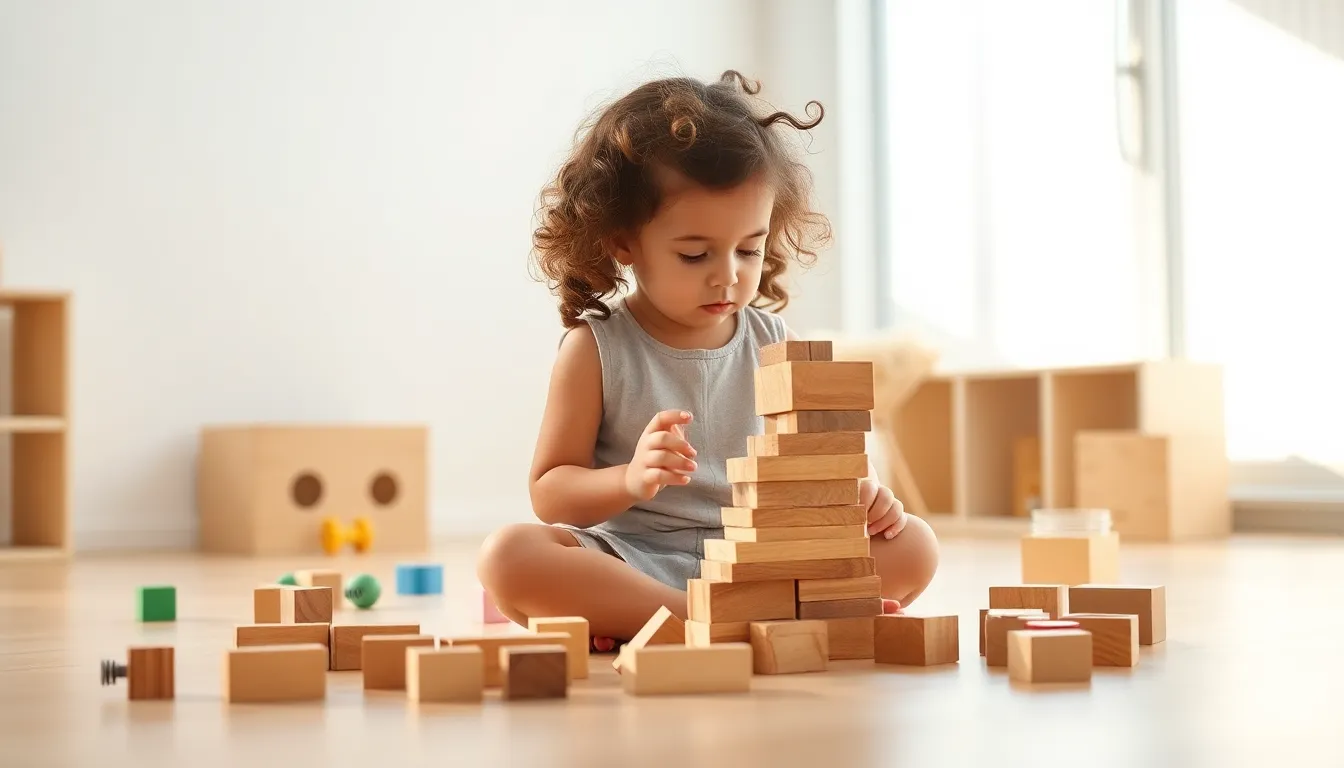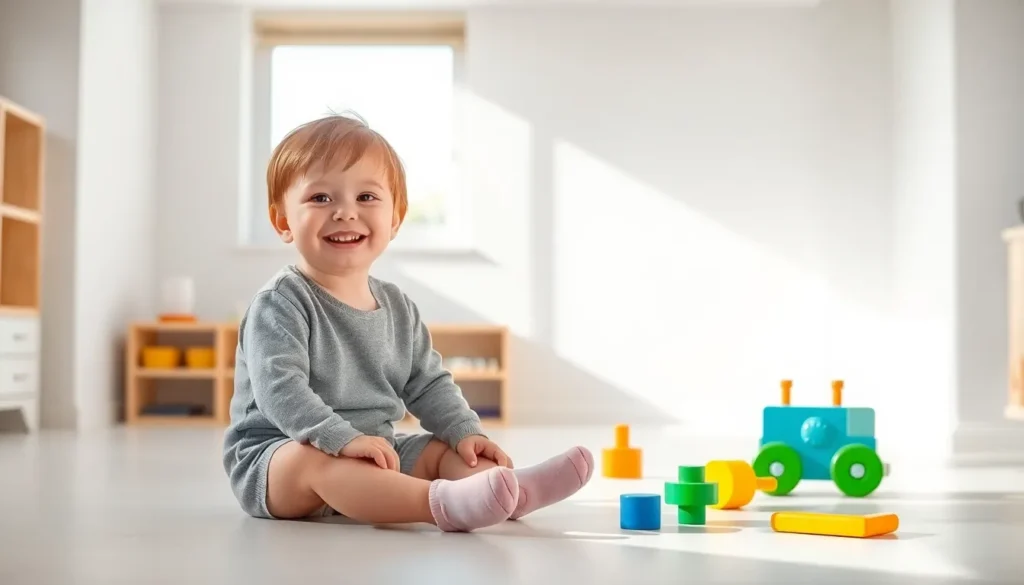In a world overflowing with toys, gadgets, and distractions, the concept of minimalist children is gaining traction among parents seeking simplicity. Embracing minimalism goes beyond decluttering; it’s about fostering a mindset that values experiences over possessions. By creating a nurturing environment that prioritizes quality over quantity, parents can help their children develop resilience, creativity, and a deeper appreciation for life’s simple pleasures.
Minimalist parenting encourages children to focus on what truly matters, allowing them to cultivate meaningful relationships and engage in imaginative play. This approach not only simplifies their surroundings but also reduces stress and anxiety, paving the way for a more mindful upbringing. As families navigate the complexities of modern life, the minimalist philosophy offers a refreshing path to raising well-rounded, content children who thrive in a clutter-free environment.
Table of Contents
ToggleWhat Is Minimalism?
Minimalism encompasses a lifestyle choice focused on simplicity and intentionality. Individuals prioritize what truly matters, reducing distractions by eliminating excess possessions and obligations. The philosophy encourages valuing quality over quantity, placing importance on meaningful experiences and relationships rather than material items.
Minimalism integrates concepts across various aspects of life, including home, work, and parenting. In the context of children, it promotes an environment conducive to creativity, learning, and growth. By fostering spaces filled with fewer but more significant items, children learn to appreciate their surroundings and maximize their engagement with activities.
Minimalism involves making conscious choices regarding consumption. Instead of accumulating toys and gadgets, parents can provide children with versatile and durable items that stimulate imagination and exploration. This approach cultivates a sense of responsibility and mindfulness, as children develop an awareness of their surroundings and the impact of their choices.
Overall, minimalism serves as a framework that helps individuals navigate life’s complexities, promoting clarity, focus, and fulfillment.
Benefits of Minimalist Living for Children

Minimalist living offers several advantages for children, fostering their personal growth and overall well-being. By simplifying their environments, children benefit from increased focus, creativity, and emotional health.
Improved Focus and Creativity
Minimalist environments promote enhanced focus and creativity in children. Fewer distractions encourage children to engage deeply in activities and explore their interests. By concentrating on limited, meaningful toys and materials, children can develop problem-solving skills and imaginative play. The freedom from clutter allows them to think critically and learn through exploration rather than passively consuming entertainment.
Enhanced Emotional Well-Being
Minimalist living supports improved emotional well-being for children. A simplified space reduces anxiety and stress, creating a calming atmosphere that nurtures emotional development. Children learn to express their feelings openly and manage their emotions effectively when they are surrounded by peace rather than chaos. With less focus on material possessions, they cultivate mindfulness and resilience, fostering a deeper connection to their experiences and relationships.
How to Foster Minimalism in Children
Fostering minimalism in children involves practical steps that promote simplicity and intentionality. Parents can guide their children through meaningful experiences that emphasize quality over quantity.
Decluttering Spaces
Decluttering spaces plays a crucial role in creating a minimalist environment. Parents can involve children in the process of sorting toys, books, and clothes, teaching them to evaluate what they truly need. This practice helps children understand the value of each item, promoting decision-making skills. Parents can establish designated spaces for belongings, encouraging children to put items back after use, which instills responsibility. Regularly scheduled decluttering sessions enable children to reflect on their possessions and develop appreciation for simplicity.
Mindful Consumption
Mindful consumption teaches children to consider the significance of their purchases. Parents can encourage discussions around needs versus wants, helping children make informed choices. Involving children in shopping can reinforce the importance of quality items over excessive quantity. Parents can also promote the idea of buying second-hand or upcycling, fostering creativity and resourcefulness. By emphasizing experiences, such as family outings or creative projects, parents can reduce the focus on material possessions, allowing children to cultivate gratitude for their experiences rather than items.
Minimalist Parenting Tips
- Involve children in decluttering: Encourage children to assess their belongings by sorting items together. This practice teaches them the value of maintaining a clutter-free environment and cultivates responsibility for their possessions.
- Promote mindful consumption: Discuss needs versus wants to help children understand the importance of making intentional choices. Reinforce the idea that quality surpasses quantity, guiding them toward meaningful purchases that enhance experiences.
- Focus on experiences: Prioritize activities such as family hikes, museum visits, or creative projects over material gifts. These shared moments foster stronger connections and instill an appreciation for life’s simple pleasures.
- Create multifunctional spaces: Design areas in the home that serve multiple purposes, such as playrooms that double as study spaces. This approach teaches children to adapt their environment for different activities, encouraging creativity and resourcefulness.
- Encourage creative play: Provide open-ended toys that inspire imagination, such as building blocks or art supplies. Limit options to stimulate creativity, as fewer distractions promote deeper engagement in play.
- Emphasize routines: Establish simple daily routines to create a sense of stability. Consistent practices, such as designated reading times or family dinners, reduce chaos and enhance emotional well-being.
- Share responsibilities: Assign age-appropriate chores to children, which fosters a sense of accomplishment and reinforces the importance of contributing to the household. This involvement nurtures independence and accountability.
- Model minimalism: Demonstrate minimalism through personal habits. Show children how to prioritize necessities and make thoughtful choices, reinforcing the principles of intentional living.
- Limit screen time: Set boundaries on device usage to reduce distractions. Opt for engaging non-digital activities that foster creativity, such as crafts, baking, or outdoor games, ensuring children connect with their surroundings.
- Cultivate gratitude: Encourage children to express appreciation for what they have. Implement practices like gratitude journals or verbal reflections to deepen their understanding of fulfillment beyond material possessions.
Embracing minimalism in parenting offers a pathway to nurturing children who value simplicity and intentionality. By focusing on meaningful experiences and fostering creativity, parents can create an environment that enhances emotional well-being and resilience. This approach not only reduces stress but also encourages children to develop a deeper appreciation for their surroundings.
Through mindful consumption and decluttering, families can cultivate a sense of responsibility and gratitude. As children learn to prioritize what truly matters, they become equipped to navigate life’s complexities with clarity and purpose. Adopting a minimalist lifestyle can lead to a more fulfilling and enriched upbringing for both parents and children alike.



